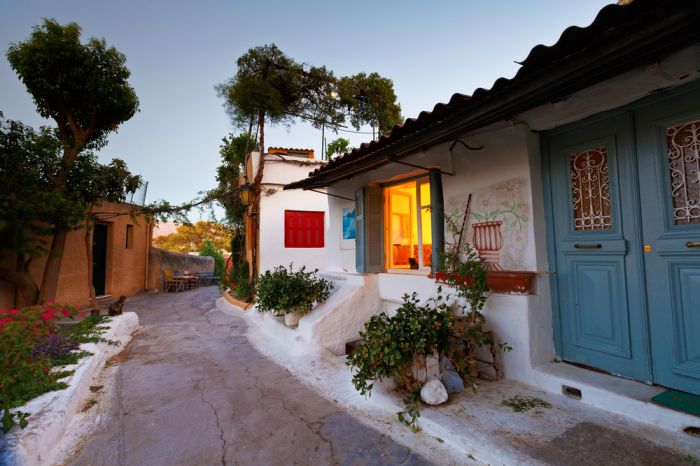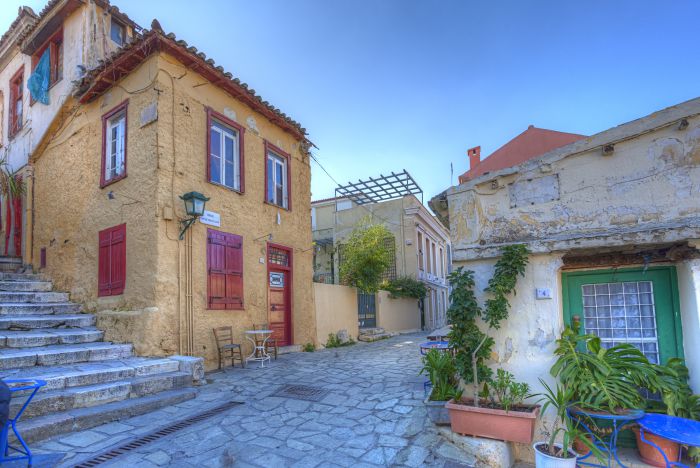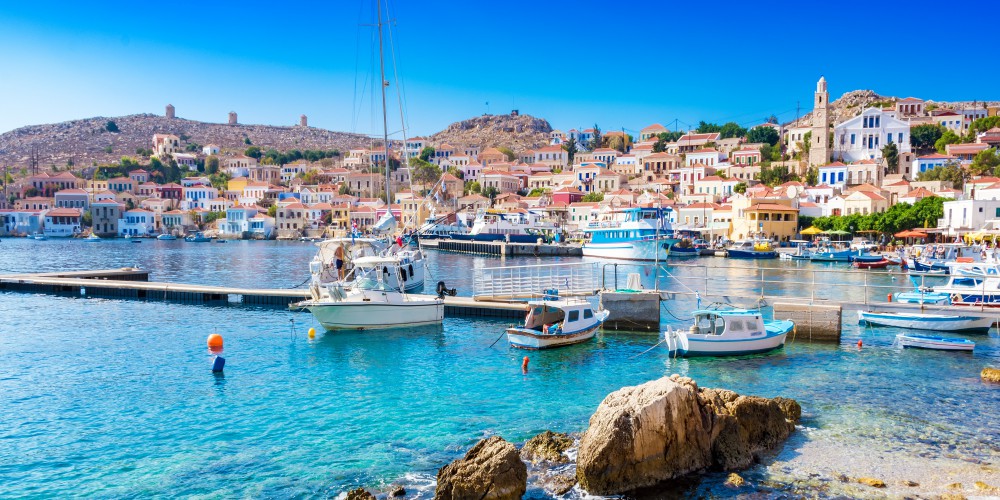
Weather in Greece in February | What to Know Before You Go
Key Takeaways:
- The weather in Greece in February is cold, with temperatures ranging between 6-14°C (43-57°F) on average.
- It is one of the most rainy months in Greece, with an average of 8-12 rainy days in most areas.
- The winds can be strong in February, especially in the Aegean Sea, which can cause rough seas and make ferry travel difficult.
- It is not uncommon to see snow in some parts of Greece in February, especially in the mountainous areas of northern Greece.

Look, a trip to Greece during February has the potential to be something magical. Well, at least that is the case if you’re looking for a specific type of getaway adventure destination. What do we mean by this?
If you’re planning a trip to Greece in February, the weather and Mediterranean climate will do all the talking.
Far gone are the days of fun under the beating Greecian sun. Most days and the average weather during February will showcase quite the opposite. An overcast sky, chilly daily temperatures in Greece in February, and a spell of rain or snow are what await you.
During this off-season, you might not always come upon bad weather. You will get your fair share of winter sun and a whole world of natural beauty and ancient history in cold weather.
But don’t let that frighten you into grabbing your Greece travel guide and rescheduling your trip. So without further ado, let’s get to the good stuff – what you can expect from time spent in Greece in February weather.
What to Expect from Greece's Weather in February

February falls smack dab in the country's winter season, stretching from November to March. Middle of winter. Sounds like a line from a Game of Thrones foreshadowing moment.
However, we wouldn’t get our swords out just yet, as February with Greecian weather holds more than chilly temperatures. According to weather data, you’ll have ample, with days ranging from an average temperature of 53ºF to a maximum temperature of 66ºF.
Add to that the looming threat of 60mm of rainfall that spreads itself across the entirety of the month. If it’s your first time experiencing Greece, its February weather conditions and oddly structured rain patterns don’t break a sweat. Monthly rainfall occurs during a seven-day period which few can predict accurately every year.
It’s worth mentioning that February Greece differs depending on where you find yourself. In the country's southern regions, you can expect an average daily temperature that stagnates an average maximum temperature at around 53ºF.
What about the Greek islands? This is a question that pops up more often than you’d expect because the Greek islands in February wear a different weather jacket every day.

Some islands, such as Kos and Rhodes, see days warmed up to a maximum temperature of 55ºF. While the southern Greek islands, like Santorini, take the crown for the driest island spot, with only about 48mm of rainfall and average highs of 55ºF.
Tip: If you’re unsure of the best time to visit Greece, then check out our nifty guide to help you decide if you should visit Greece during the entire month of February and not the high season months.
Where to Go During Greece’s February Weather

Is this a standard run-of-the-mill weather guide? It is, but there is so much more than that when you visit Greece in February.
We have compiled your ultimate travel guide to making the best of wintertime in Greece. So let’s kick things off with an in-depth focus on where to go and what to see when you visit Greece in the winter.
Tip: Eager to fill up your itinerary for a fun time in Greece during February? Let our Greece tour options stir your adventurous spirit and treat those itchy feet.
Santorini

Undoubtedly, Santorini in February is a highlight of why visiting Greece during its wintertime is a fantastic idea.
This has two main positive side-effects: a lower number of tourists flocking to the island and a drop in prices, which makes it the cheapest time to visit the otherwise luxury island. It’s the best time to visit Santorini with a flair for living things like a local.
What to Do in Santorini, Greece, in February
What you should do during the winter month of February in Santorini is a glorious combination of cultural activities, any culture vulture would delight in. You might not be able to enjoy the Aegean Sea or any water sports, but there is plenty more of you to entertain yourselves with!
For example, you should explore some of the island's unique museums, including the Archaeological Museum of Santorini and the Museum of Prehistoric Thera.
If you’re a photography buff, head to Oia, which sits high above the caldera slopes of Santorini’s volcano. Ranked as one of the most photographed places in Greece, it’s a sheer display of white-walled, blue dome architecture sure to stick in your mind for years.
What’s a trip to Greece without indulging in some of the country’s best wine harvests and heritage? Still pretty great, but if you’re anywhere close to Santorini during winter, you’ll find a wonderland filled with the best in wine. To experience the best of both sides, head to the Koutsoyannopoulos Wine Museum.
Nafplion

Nafplion is a quintessential Greecian tourist territory, and if you’re looking for a romantic setting for your next trip, look no further. A typical day in the cascading bougainvilleas, Byzantine churches, Turkish fountains, and neoclassical buildings comes with a fair taste of winter in Greece.
What to Do in Nafplion, Greece, in February

Yes, there is a staggering amount of great things to do in the city of Nafplion, but some genuinely shine during the haze of winter. If your wanderlust seems almost insatiable, explore the Old Town of Nafplion or people-watch from any of the hundreds of streetside cafes.
You can take a trip to the Venetian fortress of Bourtzi, set within the harbor of the tiny island inlet of Agio Theodori. If you’re heading out during the low season (like February), you’ll only be able to admire it from a distance.
Thessaloniki

One city you should visit during any time spent in Greece during February is the second largest one, Thessaloniki. It often goes undiscovered due to its tendency to fly under the radar, but if you’re here immersing yourself in the weather of February, you shouldn’t skip it.
What to Do in Thessaloniki, Greece, in February
History buffs unite as the city of Thessaloniki is a marvel of ancient ruins and cultural treasures, from the famous Roman Forum and the Rotunda to the Galerian Complex and the White Tower. Then you can spend time exploring some of the many UNESCO World Heritage-listed Byzantine churches.

When you wake up one morning with the urge to go museum-hopping, then boy, do we have a stellar line-up for you in Thessaloniki. Of particular note is the MOMus, or the Museum of Contemporary Art/Macedonian Museum of Contemporary Art.
On warmer nights, you’ll be pleasantly surprised by the abundance of nightlife Thessaloniki offers. Numerous tavernas and bars line the streets of many neighborhoods in the city, especially in hotspots such as Ladadika, Valaoritou, and Polytechneiou.
If instead of Thessaloniki, you want to visit Athens, we promise the bad weather will not be a problem! The capital city of Greece, with its ancient Greek ruins, the famous Acropolis Hill, and the National Archaeological Museum, boasts good weather most of the year, so you are guaranteed an enjoyable trip!
Final Thoughts | Weather in Greece in February

Often eager travelers overlook winter months at their chosen destination due to the cool weather, rainy days, and increased average rainfall levels. But Greece weather makes all the difference in the world, and visiting Greece in February is a great choice.
Sure, you can choose to visit Greece in winter months like January and March, but if you’re after a serene escape from crowds, a taste of the local life, and a budget-friendly holiday hotspot, there’s only one thing left to do.
That, of course, is to book your direct flights and accommodation. Go ahead, the weather in Greece in February isn’t going anywhere, but you surely should.
Frequently Asked Questions
Is February a good time to go to Greece?












